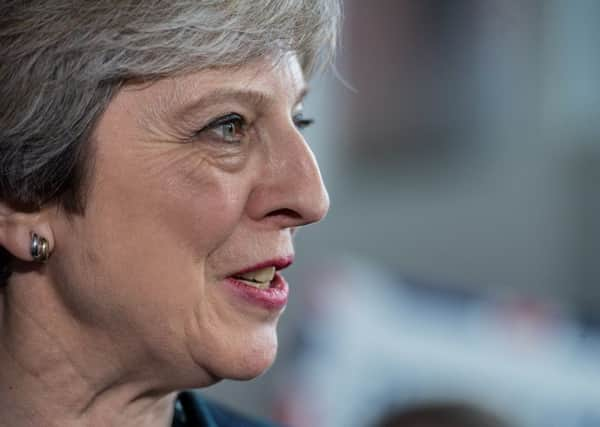Theresa May interview: '˜I still go out and knock on doors to hear from people'


IT IS nine months since she became Prime Minister, but it was only this week that Theresa May made her first visit in the role to Yorkshire.
Mrs May insists the reason is nothing more than the demands on her time since taking office, not least from preparing for Brexit.
Advertisement
Hide AdAdvertisement
Hide AdAnd she describes the General Election campaign as an important opportunity to engage with people across the country.
“As a politician I’ve always been somebody who actually likes campaigning in the sense of getting out on the streets. I still, in my own constituency, go out and knock on doors, just to get out there and talk to people and hear from people,” she says.
The Prime Minister may not have visited the region before, but she is aware of the problems it faces, not least through the open letter and six-point plan delivered to Downing Street by The Yorkshire Post on Yorkshire Day last year.
Transport was identified as a key issue and she is swift to dismiss recent reports the Conservatives are about to backtrack on their commitment to HS2.
Advertisement
Hide AdAdvertisement
Hide AdBut she is more cautious when it comes to emerging plans for high speed trans-Pennine services connecting Yorkshire and the North-West.
“The issue is there are a number of options that are being looked at in relation to HS3 or Northern Powerhouse Rail.
“But what I would say is those big projects are not the only way in which we are looking to invest in transport in the region. There’s something like £1bn I think over this period of time that is being put into uprating rail transport in a whole variety of ways.
“It’s not just about waiting for big projects, it’s actually about ensuring that we’re doing work in the interim as well.
Advertisement
Hide AdAdvertisement
Hide Ad“Work is still being done on [NPR] but there are number of options that have been put forward for it.”
Mrs May has been a vocal supporter of former John Lewis boss Andy Street’s bid to be the first metro-mayor for the West Midlands in elections taking place next week.
But the delay in the Sheffield City Region devolution deal and the failure to reach agreement in the rest of the region over the transfer of powers from Whitehall means there no mayoral elections in Yorkshire, let alone candidates to support.
Her ministers have faced criticism from council leaders that they are not using their financial, legal and political powers to help end the deadlock but she insists the onus is on local politicians to find solutions.
Advertisement
Hide AdAdvertisement
Hide Ad“This is about authorities in a local area being willing to come together and to work together for a greater good and you can only get that, I believe, if they have genuinely been part of recognising that what they are proposing is going to work for their area.”
However, the Prime Minister does hint that she may not be as wedded to the idea of metro-mayors as her predecessor or former chancellor George Osborne who began the process.
She says: “What I would say about the devolution and metro-mayor agenda is it isn’t all about metro-mayors. There are a number of models that have been developed, there are a number of mayoral elections next week, but some other models have been developed also in terms of the sort of powers and arrangements there might be in particular areas.”
Amid the many questions raised by Brexit, the future for Yorkshire’s farmers outside the Common Agricultural Policy is among the most acute.
Advertisement
Hide AdAdvertisement
Hide AdThe Prime Minister stresses the desire for certainty must be balanced against the need to come up with the right replacement support system.
“If you look across the variety of agriculture, there are different pressures, different concerns from different types of farmers, not just livestock versus arable but also different parts of the country. We need to make sure that we get this right.”
THERESA MAY goes into the General Election less than a year after becoming Prime Minister following the resignation of David Cameron.
“It’s a job like no other,” she says.
“Obviously having been a senior member of the cabinet for six years as Home Secretary I was used to a challenging role but of course as prime minister you look across a far wider range of topics and decisions.”
Mrs May describes the job as “hugely time-consuming”.
Advertisement
Hide AdAdvertisement
Hide Ad“Most of my reading of novels tends to happen on holiday I have to say. There’s the odd snatches of television when I can.
“It means I try not get involved in many series because I might not be able to keep up with them,” the Prime Minister says.